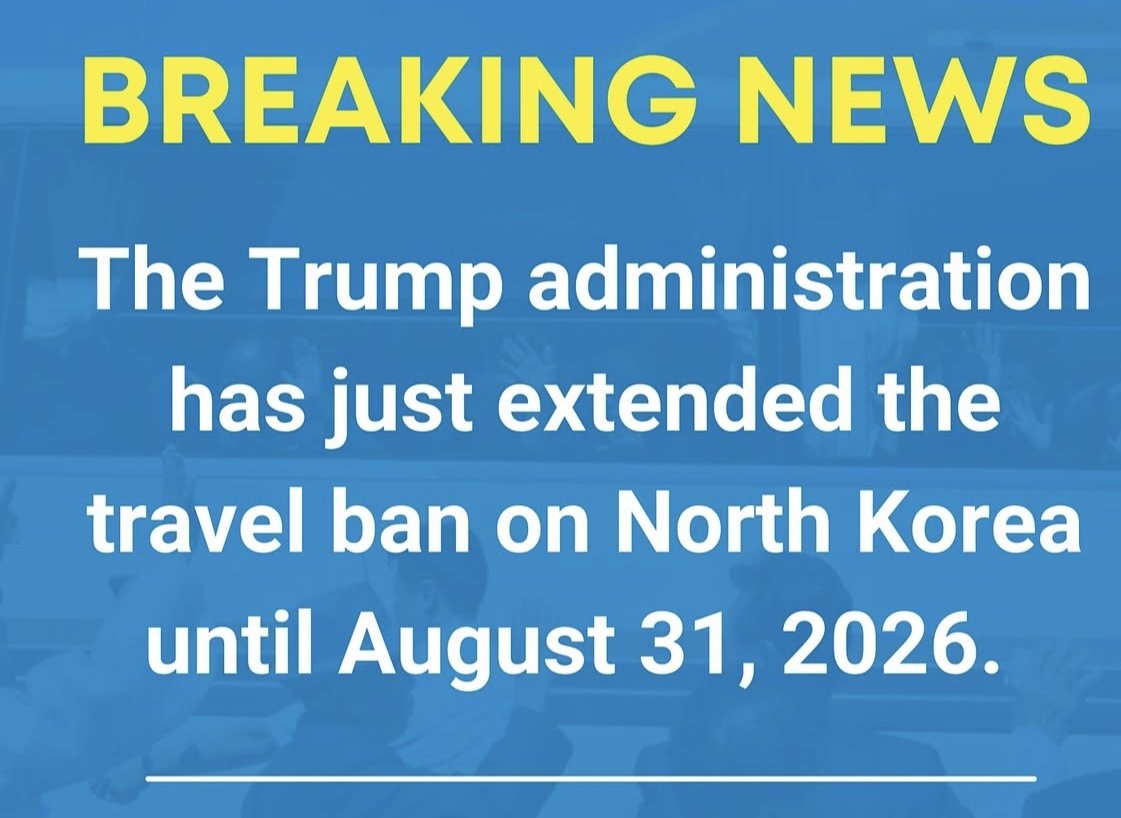U.S. Travel Ban Renewed for the 9th Year
On May 14, the U.S. travel ban to North Korea (DPRK) was renewed for the ninth time. Ever since the travel restriction was issued on September 1, 2017, the ban continues to be the longest and most extreme U.S. travel restriction, now lasting up through August 31, 2026.
When President Trump returned to office for a second term, humanitarian organizations working on the ground in the DPRK were hopeful. President Trump was the only U.S president to have met Chairman Kim Jong Un. Their meeting in 2018 at the Singapore Summit initially altered the trajectory of U.S.-DPRK relations, but this breakthrough was short-lived as it abruptly fell apart months later at the Hanoi Summit. Because President Trump was the only U.S. president to initiate talks with the DPRK, many organizations hoped that his re-election would indicate more openness towards engagement and progress towards peace.
But in reality, it was the Trump administration that implemented the most stringent sanctions against the DPRK. Under the administration, a geographic travel restriction (GTR) was implemented for all U.S. citizens traveling to or through the DPRK. Being the only ban of its kind, the restriction makes all U.S. passports invalid for travel to the DPRK. The only exception is for state-approved humanitarian work, journalism, and other activities in the national interest. These select groups and individuals are occasionally granted travel through special validation passports, with humanitarian organizations receiving the majority of these passports. However, no other country in the world is subject to such extreme travel restrictions by the United States.
Prohibiting U.S. passport holders from traveling to the DPRK has particularly impacted Korean Americans. The policy has kept Korean families, who have been separated for decades as a result of the Korean war, indefinitely apart. As the war generation is passing away, many of these U.S. citizens will never again be reunited with long-lost family members. In addition, even with SV passports, the travel ban has hindered timely delivery of life-saving humanitarian aid and prevented civil society groups from meaningful, peacebuilding exchanges.
Each year the travel ban is renewed on a year-to-year basis by the Department of State. In prior years, the extension was typically announced a month to a few weeks before the September 1st expiration date. However, this year the travel ban was renewed several months in advance, indicating a strategic decision by State.
Unfortunately, this bold decision may discourage any potential of bringing DPRK back to the discussion table. After more than 70 years since the Armistice Agreement, nothing has significantly changed in U.S.-DPRK relations. There has been no official peace treaty to end the Korean War, and the United States has no official channel through which to talk to the DPRK. No liaison office. No diplomatic relations.
DPRK’s current silence indicates that they are done talking. Actionable steps may be needed before the DPRK risks trusting a country whom they deem untrustworthy. Indeed, both parties have made empty promises. At the moment, there is no reason to believe that anything will change in the USA-DPRK relationship. For any diplomatic progress to be made, tangible changes in U.S. policy are needed.
Despite nine years of sanctions, the DPRK persevered in the midst of a global pandemic and border closures to develop a nuclear program. Sanctions clearly did not work. They only served to unite DPRK with their closest allies in a greater resolve against the United States. Now more than ever, Russia and the DPRK are fully committed to a strategic, long-term partnership.
However, one actionable step the U.S. could take would be to lift or amend the travel ban. Another could be declaring an end to the Korean War. Still another could be adding caveats to the travel ban or exemptions for humanitarian engagement.
Instead of an all or nothing approach, the U.S. needs to send a positive message to the DPRK. The DPRK needs a reason to begin trusting the United States. Until the U.S. puts forth positive action, it is unlikely that the DPRK will want to engage in peace talks.
What will matter is a commitment for peace. It takes time for the two sides, that is for two countries with two completely different worldviews, to unpack misunderstandings, acknowledge past hurts and disappointments, and come to a workable solution. The important thing is to be committed to working towards a more positive and peaceful future.
Meaningful peace talks only happen on the basis of mutual understanding. Mutual understanding must first come from understanding the context and worldview of the other. This is only possible through person-to-person exchanges in which we truly begin to understand the other. Without the freedom to travel and personally meet DPRK citizens, these kinds of exchanges are nearly impossible, and, in the end, positive change is unlikely.
To petition to end the travel ban on North Korea, click here.

